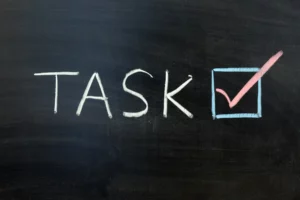I. Introduction
The article “How to Manage Your Tasks” offers advice on how to manage your time effectively and remain organized. It addresses the significance of comprehending one’s objectives and decomposing challenging jobs, the advantages of planning and scheduling, advice for maintaining concentration, methods for lowering stress, and procedures for preventing burnout. A summary of the main ideas and recommendations for additional reading are provided in the guide’s conclusion.

A. Explanation of the importance of managing your task
In today’s fast-paced environment, task management is a vital ability for individuals. It lets you prioritize your obligations, stay organized, and finish activities quickly. Good task management allows you to make the most of your time while reducing stress and increasing productivity. It also allows you to fulfill deadlines and accomplish personal and professional objectives. You may strengthen your sense of control over your workload and improve your general well-being by managing chores well. Good task management abilities are essential for success whether you are a student, an employee, or a business owner.
B. Brief overview of the topics that will be covered
“How to Manage Your Tasks” will cover the following topics:
- Understanding your tasks: Identifying goals and priorities, breaking down complex tasks into smaller parts.
- Planning and Scheduling: Create a to-do list, using a calendar or scheduling app, and allocate time for each task.
- Staying focused and avoiding distractions: Tips for staying focused, strategies for reducing distractions.
- Managing stress and burnout: The impact of stress on task management, techniques for reducing stress, taking breaks and practicing self-care.
- Conclusion: Recap the critical points, final thoughts, and suggestions for further reading.
The guide will provide practical advice and tips for individuals looking to improve their task management skills and increase their productivity.
II. Understanding your task
Knowing your tasks is a critical step in task management. It entails determining your goals and priorities, as well as breaking down complicated activities into smaller, more manageable chunks. You can prioritize your obligations and make the most of your time if you understand your job. This part of “How to Manage Your Tasks” will include advice and tactics for developing a clear picture of your duties, creating attainable objectives, and breaking difficult activities down into smaller, manageable chunks. You may operate more efficiently and successfully if you better grasp your job, decreasing stress and improving production..
A. Identifying your goals and priorities
A crucial first step in efficient work management is determining your priorities and goals. This method entails assessing your duties and deciding which duties are most crucial. You may concentrate your efforts on the activities that will have the most impact by creating clear goals and priorities. This will also help you make efficient use of your time and resources.
List all of your jobs and obligations as a starting point for determining your objectives and priorities. Assess each one’s priority and urgency levels after that. By doing so, you may prioritize your duties and decide which ones should be finished first. Moreover, think about how each activity fits into your overall strategy and your long-term objectives.
Also, it’s crucial to periodically review your objectives and top priorities because they could alter with time. You’ll be able to maintain your concentration and adjust to new difficulties and possibilities as a result.
The Eisenhower matrix basically a technique for shorting tasks into an important and urgent basis. This technique helps to concentrate on the task and also help to eliminate task that are ot necessary to complete.
In this matrix, four boxes are available where urgent, not urgent, and important, not important headers are shown. We sort our tasks in the form of important and urgent tasks into first priority and put all into the Do Box and less urgent but important tasks are scheduled into other free time. In the Delegate Box, we put all tasks that are non-important but urgent assigned to the delegate, and if any task that not important and not urgent for this time eliminate those tasks from your task management list.
To summarise, the secret to effective work management is clearly defining your objectives and goals. You may operate more effectively and efficiently, lowering stress and boosting productivity, by concentrating on the most crucial activities and periodically reevaluating your priorities.
B. Breaking down complex tasks into smaller, manageable parts
One of the most important techniques for efficient task management is to divide difficult work into smaller, more manageable chunks. This method entails breaking a huge, complicated work down into smaller, easier-to-manage parts that may be finished separately. You may make a task easier to manage, lessen the tension and anxiety it causes, and improve your chances of accomplishment by breaking it down in this way.
Start by identifying the ultimate result when decomposing a complicated activity. Then, make a list of all the steps necessary to accomplish that goal. Instead of attempting to do the activity all at once, think about breaking it up into smaller parts that may be accomplished over time.
It’s crucial to give each phase the attention it deserves and to allot the necessary time and resources. You can stay focused and keep out of overload by doing this. Also, breaking activities down into smaller sections will help you monitor your progress and, if required, make changes along the way.
In conclusion, a crucial tactic for efficient task management is breaking complicated activities down into smaller, more manageable pieces. You may make activities more doable, less stressful, and more likely to succeed by breaking them down into smaller parts.
III. Planning and Scheduling
Planning and scheduling are critical components of good task management. You may guarantee that your chores are performed efficiently and successfully by generating a to-do list, utilizing a calendar or scheduling tool, and designating time for each activity.
A. Creating a to-do list:
A to-do list is a basic yet efficient method of organizing your responsibilities. List down all the chores you need to perform and rank them based on priority and urgency. This will allow you to concentrate on what has to be done while without feeling overwhelmed.
B. Using a calendar or scheduling app:
Utilizing a calendar or scheduling tool might help you keep organized and on schedule. You can book appointments, make reminders, and keep track of your chores all in one spot.
C. Allocating time for each task:
Setting aside time for each activity is a key step in good task management. Setting aside a particular amount of time for each work ensures that you have enough time to finish it properly and without feeling pressured.
To summarize, planning and scheduling are critical components of good task management. You may keep organized and on track by making a to-do list, utilizing a calendar or scheduling tool, and designating time for each activity, lowering stress and improving productivity.
IV. Staying focused and avoiding distractions
Good job management requires staying focused and avoiding distractions. Distractions can cause you to sluggish and disrupt your workflow, resulting in lost productivity and increased stress.
A.Tips for staying focused:
Reduce distractions as much as you can, make your workspace quiet, and develop a routine to help you stay concentrated. Also, taking brief breaks to stretch and get some fresh air might be beneficial.
B. Strategies for reducing distractions:
Limit your exposure to sources of distraction, such as social media or email, to decrease interruptions. You can also use equipment like noise-canceling headphones and your phone’s “Do Not Disturb” setting.
Finally, remaining focused and avoiding distractions is critical for good work management. You may work more efficiently and effectively, lowering stress and boosting productivity, by applying suggestions for keeping focused and tactics for eliminating distractions.
V. Managing stress and burnout
Effective task management requires efficient stress and burnout management. Excessive stress levels might make it hard for you to focus on activities and accomplish them successfully.
A. The impact of stress on task management:
Stress can raise the risk of making mistakes, exhaustion, and low productivity. It can have a negative impact on Your physical and mental health and may suffer as a result.
B. Techniques for reducing stress:
To reduce stress, consider practicing relaxation techniques like deep breathing, meditation, or yoga. You can also try to prioritize self-care activities, such as exercise, healthy eating, and getting enough sleep.
C. Taking breaks and practicing self-care:
It is vital to make pauses and practice self-care in order to reduce stress and prevent burnout. Taking frequent pauses during the day can assist you in recharging, refocusing, and remaining motivated. Furthermore, self-care activities such as exercise, good food, and getting adequate sleep can assist you in maintaining a healthy work-life balance.
Finally, successful task management necessitates the control of stress and burnout. You may work more effectively, decrease stress, and enhance productivity by applying stress-reduction tactics, taking breaks, and practicing self-care.
VI. Conclusion
To summarize, good task management is a vital component of personal and professional success. You may enhance productivity, minimize stress, and achieve your objectives by comprehending your work, determining your goals and priorities, breaking down complicated activities, planning and scheduling, remaining focused and avoiding distractions, and managing stress and burnout.
A. Recap of the key points:
Understanding your duties, setting goals and priorities, breaking down challenging jobs, planning and scheduling, being focused and avoiding distractions, and managing stress and burnout are just a few of the essentials of effective task management covered in this post.
B. Final thoughts and suggestions for further reading:
There is always potential for enhancement in task management, which requires a combination of abilities and strategies. Read productivity and time management books or articles for further advice and ideas.
To summarize, effective task management is a crucial aspect of success and demands a certain combination of skills and strategies. By putting the information in this article to use, you could increase productivity, reduce stress, and achieve your objectives.

